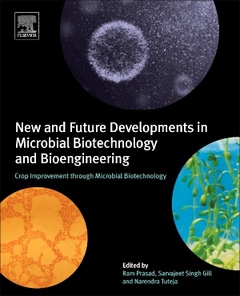Description
New and Future Developments in Microbial Biotechnology and Bioengineering
Crop Improvement through Microbial Biotechnology
Coordinators: Prasad Ram, Gill Sarvajeet Singh, Tuteja Narendra
Language: English
Subjects for New and Future Developments in Microbial Biotechnology...:
Keywords
Abiotic stress; Abiotic stress tolerance; Actinomycetes; Actinorhizal; Agriculture; Agrobacterium; Antagonists; Antibiotics; Artificial miRNA; Bacteria; Bacterial endophytes; Biocontrol; Biocontrol agent; Biocontrol agents; ÂBiodegradation; Biodiversity; Biofertilizer; Biofertilizers; Biopesticide; Biotechnology; Biotechnology; Biotic stress; Biotransformation; Colonization; Consortium; Cotton; CRISPR/Cas9; Crop breeding; Crop improvement; Crop improvements; Crop production; Crop yield; Cyanobacterial; Diagnosis; Disease resistance; Diversity; Double-strand breaks; Drought; Enzymes; ETI; Farming; Fermentation; Flooded conditions; Food; Food safety; Food security; Fungal endophytes; Fungi; Gene transfer; Genetic engineering; Genome editing; Genome evolution; Genome sequencing; Genomics; Gluconic acid; Homology-directed repair; Host-microbe interaction; Immunologic methods; Induced systemic resistance; Innate immunity; Metabolomics; Methane emission; Microbes; Microbial genes; Microbial technology; Microbiome; Microorganisms; Mineral solubilizers; Molecular tools; Mycoparasites; Mycorrhiza; Mycorrhizae; Nitrogen; Nitrogen fixation; Nutritional improvement; Pathogen-derived resistance; Pathogens; Pesticide; Pesticides; PGP; PGPR; PGPR detection; Phosphatase; Phosphate; Phosphate rock; Phosphorus; Phytase; Phytate; Phytoremediation; Piriformospora indica; Plant growth; Plant growth promoters; Plant growth promotion; Plant growth-promoting rhizobacteria; Plant immunity; Plant pathogen; Plant virus; Plant-microbe interactions; Pseudomonas fluorescens; PTI; Recognition and specificity; Resistance; Rhizobia; Rhizosphere; Rice soils; RNA interference; Root exudate; Salinity; SCBV; SCMV; SCSMV; SCYLV; Siderophores; Soil pollution; Sugarcane; ÂSymbionts; Transcriptomics; Transgenic; ÂTricalcium phosphate; Viral disease; Viral genomes; Virus resistance; Zinc-finger Ânucleases
496 p. · 19x23.3 cm · Paperback
Description
/li>Contents
/li>Readership
/li>Biography
/li>Comment
/li>
Crop Improvement through Microbial Biotechnology explains how certain techniques can be used to manipulate plant growth and development, focusing on the cross-kingdom transfer of genes to incorporate novel phenotypes in plants, including the utilization of microbes at every step, from cloning and characterization, to the production of a genetically engineered plant. This book covers microbial biotechnology in sustainable agriculture, aiming to improve crop productivity under stress conditions. It includes sections on genes encoding avirulence factors of bacteria and fungi, viral coat proteins of plant viruses, chitinase from fungi, virulence factors from nematodes and mycoplasma, insecticidal toxins from Bacillus thuringiensis, and herbicide tolerance enzymes from bacteria.
1. The Use of Microorganisms for Gene Transfer and Crop Improvement 2. Actinomycetes as potential plant growth promoting microbial communities 3. Microbial genes in crop improvement 4. Microbial transformations implicit with soil and crop productivity in rice system 5. Application of Microbial Biotechnology in Food Processing 6. Innate immunity engaged or disengaged in plant-microbe interactions 7. Novel Strategies for Engineering Resistance to Plant Viral Diseases 8. Molecular characterization of sugarcane viruses and their diagnostics 9. Cyanobacterial Biodiversity and Biotechnology: A Promising Approach for Crop Improvement 10. Pseudomonas flourescens - A Potential Plant Growth Promoting Rhizobacteria (PGPR) and biocontrol agent 11. Crop Improvement Through Microbial Technology: a Step Towards Sustainable Agriculture 12. Microbial technologies for sustainable crop production 13. Trichoderma, its multifarious utility in crop improvement 14. Microbe-mediated enhancement of nitrogen and phosphorus content for crop improvement 15. Microbiome in Crops: Diversity, distribution and potential role in crops improvements 16. Plant Growth Promoting Rhizobacteria (PGPR): Perspective in Agriculture under Biotic and Abiotic stress 17. Rhizosphere metabolite profiling: An opportunity to understand plant–microbe interactions for crop improvement 18. Phosphate-solubilizing Pseudomonads for improving crop plant nutrition and agricultural productivity 19. Targeted Genome editing for crop improvement in post genome sequencing era 20. Endophytic Microorganisms: Their Role in Plant Growth and Crop Improvement 21. Microbes in crop improvement: future challenges and perspective 22. Plant-microbe interaction and genome sequencing: an evolutionary insight 23. Crop breeding using CRISPR/Cas9
The book is a reference for students, scientists and researchers at universities, industries, and government agencies interested in microbial biotechnology, food producing, crop improvement and all disciplines related to microbial biotechnology
Dr. Ram Prasad is an Associate Professor at Mahatma Gandhi Central University, Bihar, India. Dr. Prasad has served as an Assistant Professor Amity University Uttar Pradesh, India; Visiting Assistant Professor, Whiting School of Engineering, Department of Mechanical Engineering at Johns Hopkins University, Baltimore, United States, and Research Associate Professor at School of Environmental Science and Engineering, Sun Yat-sen University, Guangzhou, China. Dr. Prasad has more than two hundred publications to his credit, including research papers, review articles, and book chapters; has edited or authored several books; and has five patents issued or pending. He’s on the editorial boards of a number of journals, andhis research interests include plant-microbe interaction, agriculture sustainability, nanobiotechnology, and applied microbiology.
Dr. Sarvajeet Singh Gill is an Assistant Professor at Centre for Biotechnology, Maharshi Dayanand University, Rohtak. His research focus includes Agricultural Plant Biotechnology; Biotic & Abiotic stress biology, plant microbe interaction and in-silico understanding of plant genomes.
In addition to his research and teaching responsibilities he has served as Associate Editor for the Brazilian Journal of Botany, and as Guest Editor of Plant Genes. He was Guest Editor of BioMed Research International’s Special Issue (Plant Stress & Biotechnology); Frontiers in Plant Science, Section-Environmental Toxicology (Topic Title: Phytotoxicity of high and low levels of plant-beneficial heavy metal ions); Frontiers in Plant Science, Section-Crop Science and Horticulture (Topic Title: The Brassicaceae - agri-horticultural and environmental perspectives); Frontiers in Plant Science, Section-Plant Physiology (Topic Title: Recent insights into the double role of hydrogen peroxide in plants); and Functional Genomics Approaches to Decipher Plant Resilience to Environmental Stresses (International Journal of Plant Genom
- Introduces the principles of microbial biotechnology and its application in crop improvement
- Lists various new developments in enhancing plant productivity and efficiency
- Explains the mechanisms of plant/microbial interactions and the beneficial use of these interactions in crop improvement
- Explores various bacteria classes and their beneficial effects in plant growth and efficiency




